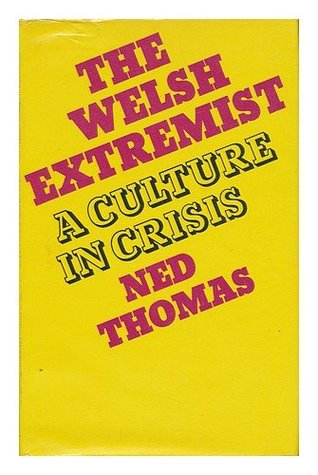I HAD GROWN up with the word extremist almost constantly in my newspaper – Kenya, Cyprus, Israel, Malaya, Aden; very often the word changed to terrorist and then one day the words would disappear and the head of a new independent state would arrive in London to meet the Queen.
…yw brawddeg gofiadwy gyntaf The Welsh Extremist gan Ned Thomas, awdur, meddyliwr a newyddiadurwr (i The Times yn y 60au yn ogystal â chyhoeddiadau eraill).
Mae Cymdeithas yr Iaith newydd ail-gyhoeddi’r llyfr The Welsh Extremist fel fersiwn digidol am ddim – dan drwydded Creative Commons:
Ned Thomas – The Welsh Extremist (PDF)
(Neu OpenOffice / TXT)
Daeth y llyfr mas yn wreiddiol yn 1971 trwy gwmni Victor Gollancz o Lundain ac wedyn fel clawr meddal trwy’r Lolfa o Dalybont.
Yn y llyfr mae Ned Thomas yn trafod yr ymgyrchoedd dros statws a hawliau i’r iaith a dros sianel deledu Cymraeg. Meddai’r awdur Niall Griffiths am y llyfr:
Non-fiction, and frightening; not because of its promotion of militancy, heck no, but because of its revelations and analysis concerning the insidious and evil hegemonic takeover of whole countries, entire ways of life. On behalf of all oppressed nations, and for the individual creative effort threatened by the barren swamp of enforced uniformity. As vital now as it was in the 70s, and as important as Franz Fanon’s The Wretched of the Earth. Endorsed by Raymond Williams, and he knew a thing or two.
Mae Ned Thomas yn cyfrannu penodau llawn am Saunders Lewis, Dr Kate Roberts, Gwenallt. Efallai bydd rhai o’i bwyntiau yn amlwg i ddarllenwyr Y Twll achos roedd e’n meddwl am gynulleidfa di-Gymraeg ond mae’n werth darllen am yr amser a’r barnau profoclyd, e.e. y peth yma am yr ‘SRG’ yn y 60au a 70au versus Cân i Gymru:
It would be wrong to suggest that all Dafydd Iwan’s songs are political – he sings folk songs and love songs, children’s songs and settings of Welsh poems – or indeed that all his political songs are successful; nor is he the only writer of good political and satirical songs (there are Huw Jones and Mike Stevens). But one can say of the whole Welsh pop movement that it has derived its special character, and reached its highest point, in the political songs, and also that these are the songs which, generally speaking, have sold best. Through the popular song, through Dafydd Iwan in particular, the ideas of the Welsh leadership have been able to get through, in one of the few ways now open, to the ordinary Welsh-speaker, especially in the younger generation. A sure sign that they are getting through is the fact that Welsh members of parliament have from time to time spoken of the pop movement as if it were a sinister conspiracy. There have been efforts to divert the pop impulse into non-political channels, too. In Investiture year a “Song for Wales” competition was organized on television, where clearly a non-protesting approach was required. The results were lamentable as one would expect. The fact is that the liveliness of the young Welsh generation and of its singing is inseparable from the protest.
Mae fe’n codi’r pwynt o’r diffyg safbwyntiau amgen, yn enwedig yn Gymraeg ac ar y teledu, pan oedd yr Establishment yn darlledu’r Arwisgiad Charles yn 1969.
The inadequacy of Welsh television for the task of working out conflicts within the community was brought out during the period of the Investiture of the Prince of Wales in 1969…
Long before the summer the publicity machine, working from London in English and other languages to the world, had got into its stride. I was working in the Central Office of Information at the time and remember the stream of anodyne articles about Wales going out in preparation for the Investiture. Every heraldic and ancestral detail, every small irrelevant anecdote about Wales was unearthed. There was, of course, no suggestion of this being a country with any conflicts…
The occasion, seen from London, was at best a splendid spectacle, at worst another endearing royal joke.
The trouble was that this was also the kind of treatment that virtually monopolized the screens of the Welsh community within which feelings ran very high. Television in Welsh, in the small number of off-peak hours allowed it, tried to let sides put their case (though even this was limited by the timidity of regional administrators), but because of the organization of television, it was wholly drowned by the spate of English on the same channel. The result was that people felt that a tremendous public relations act was being put over, the media were a form of imposition, not something we shared and could use to work out our differences.
Dw i’n amau os oedd e’n hapus i weld y briodas frenhinol yn Gymraeg ar S4C mis diwethaf, er oedd mwyafrif o Gymry yn eithaf bodlon i’w derbyn heb sylw. Fel y dwedais, mae’r gymariaethau yn ddiddorol.
BONWS: Ned Thomas ar Pethau / ‘Ned Thomas and the Condition of Wales’ (erthygl)

